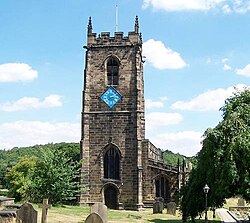Silkstone
| Silkstone | |
|---|---|
 Church of All Saints, Silkstone |
|
| Silkstone shown within South Yorkshire | |
| Population | 3,153 (2011) |
| OS grid reference | SE289058 |
| Civil parish |
|
| Metropolitan borough | |
| Metropolitan county | |
| Region | |
| Country | England |
| Sovereign state | United Kingdom |
| Police | South Yorkshire |
| Fire | South Yorkshire |
| Ambulance | Yorkshire |
| EU Parliament | Yorkshire and the Humber |
| UK Parliament | |
| Website | http://www.silkstoneparishcouncil.gov.uk/ |
Silkstone is a village and civil parish in the Metropolitan Borough of Barnsley in South Yorkshire, England. It is situated in the foothills of the Pennines, between the towns of Barnsley and Penistone, and includes the village of Silkstone Common. At the 2001 census it had a population of 2,954, increasing to 3,153 at the 2011 Census.
Silkstone Parish is twinned with Saint-Florent-des-Bois in France.
The name Silkstone is Old English in origin and is thought to derive from the Anglo-Saxon man's name Sylc and the suffix tūn meaning a farmstead, giving "Sylc's farmstead". The earliest known written record of Silkstone is the Domesday Book of 1086, when Silkstone is referred to as a part of the manor of Cawthorne:
In Calthorne (Cawthorne) Ailric had three carucates of land to be taxed and there may be two ploughs there. The same now has it of Ilbert; himself two ploughs there, and four villanes with two ploughs. There is a vicor and a church, wood pasture two miles long and two broad; the whole manor three miles long and two broad. Value in King Edward's time forty shillings, now twenty shillings. To this manor belongs Silchestone, one carucate and a half.
The church mentioned may be a predecessor of the current Church of All Saints, the parish church in Silkstone. Silkstone parish originally included Cawthorne, West Bretton, Cumberland, Barnsley, Dodworth, Stainborough, Thurgoland, and Hoylandswaine.
The Silkstone coal seam is at its shallowest in the Silkstone area, and mining was an important local industry. In 1809 a waggonway was built through the village by the Barnsley Canal Navigation Company. The waggonway was used to transport coal from collieries in the Silkstone valley to Cawthorne. A memorial commemorating the waggonway stands in the village.
...
Wikipedia

